Interview With Judy Bogen
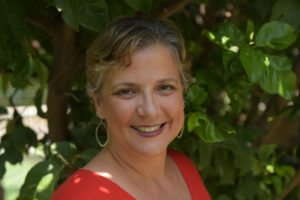
Judy Bogen is quite the amazing woman! Through her own experience with breast cancer, she found her calling–helping others going through cancer treatment by changing their treatment environments. Judy researched, reached out, and realized her dream–Place2Heal. She dove right in, has never looked back–and has plenty more dreams to fulfill in the future. Thank you Judy for following your heart and for bringing color and comfort to so many!
Diane: Welcome, Judy!
I’m so interested in your project! Before we start, I have a personal connection to your story. I also had breast cancer. I didn’t have chemo but had radiation. And I remember waiting for the radiation … First of all, when we changed into the ratty gowns they had for us, the changing rooms didn’t even have doors—just curtains. When people were looking for an empty room, they’d just open the curtain while you’re getting changed. After that you waited and you waited and waited in another room before treatment. The environment was horrible.
Judy: Where was that? That was in the States?
Diane: It was in New York. The environment was cold and ugly and didn’t feel respectful.
Judy: I think a lot of the radiation departments are like that.
The equipment is crazy expensive. I don’t think they really invest in the environment because people come in and leave.
Diane: My experience was you had to come in every day for I think 27 days. That was the protocol back then, but the wait every day was over an hour.
I hated the whole experience, but I never really thought about how much of a difference an environment can make. So thank you.
Please tell us how you came to this wonderful project.
“I Was 38 At The Time. Suddenly, Overnight, Literally, I Went Into Menopause”
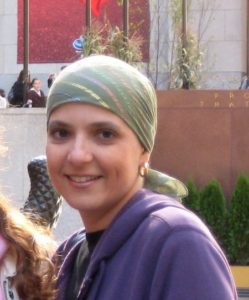
Judy Bogen 2009
Judy: So, I’m 51. I was born in London, and I came to live in Israel when I was 24, in 1993, with my husband and we built a life here. We have three kids.
My sister, still in London, was diagnosed with breast cancer. People told me to see a doctor to check if it was genetic. When the doctor asked me if I wanted to do genetic testing, I asked what the ramifications were. He said, “Well, if you are a carrier, you need to have your ovaries removed, and you need to have a bilateral mastectomy.” Very extreme.
I told him, “I can’t have my ovaries removed because I want to have more children.” And I added, “Over my dead body, would I ever have a mastectomy.” That was approximately a year before I actually ended up having a mastectomy.
I was 38 at the time. Suddenly, overnight, literally, I went into menopause. I had no idea what was happening. The gynecologist did some follow up and told me I couldn’t have more children, so, I had the ovariectomy.
And then we left, in July of 2008 for a three-year stint in the States.
Diane: You had the ovariectomy because you had the BRCA gene?
Judy: Yes, the BRCA1.
So we went to Maryland, where my husband had a teaching job. And four months after we arrived, I went for a routine mammography in one of these factory radiology places, and they said, “There’s something there, but it’s nothing to worry about. Come back in six months.” I didn’t have a good feeling about it, so a month later, I found a fantastic breast surgeon in Bethesda who did a biopsy. There were two lumps, and they were both cancerous.
Diane: Wow.
“The Oncologist’s Recommendation Was A Bilateral Mastectomy With A Reconstruction”
Judy: So, this is all happening in a foreign country, 6000 miles away from home. We don’t know anybody, more or less, but the people in my husband’s school really rallied. They provided meals, play dates, rides, carpools, whatever we needed. And the oncologist’s recommendation was a bilateral mastectomy with a reconstruction.
It was a huge decision, but I did it, and something went wrong with the reconstruction. A couple of days after I’d come out of the hospital from my mastectomy, I had to go back in and the plastic surgeon had to remove everything she’d done and left me flat.
The oncologist said, “We’ve got no more time for any more surgeries. We have to start with the treatment.” So, I had eight sessions of chemo, one every two weeks.
I just suffered terribly. The hair loss was huge. My nails, my eyebrows, my eyelashes. I was skinny as anything. I didn’t have breasts.
I was very, very depressed. And even though the friends that we’ve made there were absolutely amazing, we were still miles away from home. My parents came a couple of times. My sister came once, but she found it very difficult. I don’t think she was really quite able to cope with watching someone else go through what she had been through. It was a terrible time for the kids.
Diane: I’m so sorry you all went through that.
“I Said To My Daughter, “I Think This Could Be My Calling.”
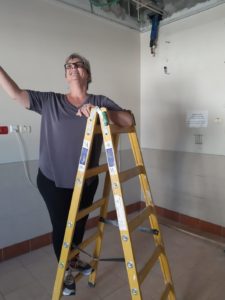
Judy Bogen at WMC before
Judy: It was terrible, but I was treated in the chemo lounge, in the oncologist’s office. The place was gorgeous. It was on the 11th floor. It had a huge window which overlooked the top of pine trees. And it just had this feeling of light and warmth and comfort. The chairs were very comfortable, and only six of us went in at a time. In Israel, you go to the hospital for treatment and there are 30, 40, 50 people… sometimes up to 100 people are treated a day. That’s a crazy number of people.
In Maryland, they provided sucking candy because I had a terrible taste in my mouth. They provided headscarves if you fancied a change. They provided DVDs that you could watch on your portable DVD player because nobody had smartphones then.
And the nurses were absolute angels. They sat with you, talked about the side effects. Every week, I’d come back with something new. My whole stomach lining wall was destroyed, and I couldn’t keep anything down. I lost my appetite, and I lost tons of weight. At the time, I didn’t give the environment a second thought. And then we finished our two years in the States and came back to Israel in the summer of 2011.
I have a wonderful oncologist in Israel. The office is okay, nothing to write home about. But one day, my daughter was with me, and we got off at the wrong floor, the treatment floor. It was like a cattle market. It was packed. People were standing. People were sitting on the arms of sofas. When we went up to my appointment, I said to my daughter, “I think this could be my calling.”
“After My Illness, I Lost Most Of My Self-Confidence”
Diane: Right then, you said “Oh, this is terrible. There has to be a change and I can do this?”
Judy: Absolutely. Literally right there.
Diane: What made you think you could do it?
Judy: That’s interesting, actually, because after my illness, I lost most of my self-confidence. I had come back from America and worked as a tour operator for a couple of years, but I wasn’t sure I wanted to be sitting behind a desk anymore. I’d done that for most of my adult life and I was very much of the opinion that I was reaching an age where it was time to do something more meaningful.
So I started to meet with lawyers and hospitals and realized the bureaucracy was going to be a very, very big deal, but, I waded my way through it somehow. And we were officially recognized as a charity in May of 2016. I called it Place2Heal.
Diane: That’s great!
Judy: We started fundraising, which is also not a natural skill. You have to find the right people to do it for you, which is what I’ve done now. And I traveled a little bit. I went to visit a couple of cancer centers in New York and met with a wonderful healthcare architect there from a large firm, who talked to me about her work.
Diane: Were you doing this all on your own?
Judy: Yes. Pretty much.
“It Just Keeps Coming Back To Our Wanting To Be In Nice Environments”
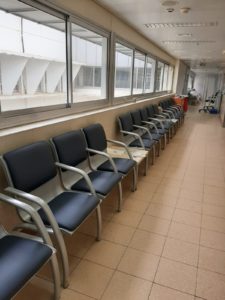
WMC corridor before
Diane: How did you even know what to research?
Judy: I started with the baseline that we all want to live and work in nice spaces. Therefore, how much more important is it for hospitals to be nice spaces, especially those that do cancer treatments? I spent a lot of time reading and making notes about hospitals in the States, Australia, England, hospitals that put an emphasis on this kind of thing.
It just keeps coming back to our wanting to be in nice environments. Nobody wants to be in a rundown facility, and for some reason, they’re always painted green and brown. I don’t understand who ever thought that that was a good idea.
Diane: I hadn’t noticed that.
Judy: Then I read about the science. The top person in the field is Professor Roger Ulrich, who’s created the Center for Health Care Design. He talks about how miserable it was for him as a child in the hospital with kidney disease. He created evidence-based healthcare design, EBHD. Things are so difficult in the nonprofit sector that the science is critical for funding. They need scientific evidence before backing you. They like to know that what you’re planning is not just based on a feeling.
Diane: Makes sense.
“I’ve Become Much More Assertive, Much More Persuasive”
Judy: When I came back to Israel in the summer of 2011, I found a plastic surgeon. I had to wait two years for him, but I had my reconstructive surgery at the end of October 2013. It was a huge 10-hour surgery. I know it’s just an external thing, but it just makes me feel a little bit more normal.
And then, I spent a good year-and-a-half reading and talking to people before beginning the journey of finding a hospital to work with. Working with a government hospital has been a real eye opener. I’ve become much more assertive, much more persuasive.
I sit in meetings with engineers, interior designers, the head oncology nurse and the head of oncology. It’s a lot to juggle. This has been a whole new thing for me. And in this particular side of things, I feel very self-confident. I get a lot of positive feedback on social media and from friends and from family, and that makes a really big difference.
Diane: One thing we talk about a lot in the blog is that we need to step outside of our comfort zones in order to grow. Being afraid is fine, but you have to keep going.
Judy: Absolutely.
Diane: So just facing the fear and taking the extra step does wonders for your confidence.
Judy: Yes. Absolutely.
“When You Get To A Certain Age, It’s Like, “If I’m Not Going To Grab It Now, Then In 20, 30 Years, I’m Going To Look Back And Say What Did I Do?”
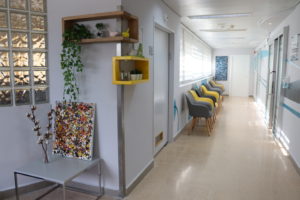
WMC corridor after
Diane: What did you learn about yourself in all this?
Judy: Well, I don’t think it was a coincidence it’s all happening as I’m in my early fifties. You’ve dedicated your whole life to working around the clock and raising your kids. When you get to a certain age, it’s like, “If I’m not going to grab it now, then in 20, 30 years, I’m going to look back and say what did I do?”
Diane: It’s the gift of getting older. There’s a certain urgency and it really pushes you. It’s similar to the biological clock that many younger women feel about having a baby. This is a different biological clock, but the more women I speak to, this is what they tell me. It’s like we find our courage.
Judy: We do, we find our courage, because we find ourselves.
Diane: We find ourselves. I love that.
Where are you now in the project?
Judy: The first room was almost done. We were good to set an opening, when the head of the hospital said, “Just give us a week just to sort out this Corona, and then we’ll get back to you.”
Diane: Famous last words, right?
Judy: And I think that was possibly the first week of March. We didn’t get back into the hospital till June.
In June, we went in and finished the final touches. We had our opening in July.
Diane: Wonderful. I saw the “before” and “after” pictures on the website-and we’ve included them here.
They’re amazing. I mean just looking at them, you feel more relaxed.
“The Opening Wasn’t What I’d Imagined It Would Be, But It Was Amazing”
Judy: We had a very small opening. We weren’t allowed more than 20 people. We weren’t allowed to serve food. So a friend of mine, who’s a novelty baker, baked cookies with our logo and the hospital’s logos. My nephew by marriage owns a winery, so he did small bottles of wine. We wrapped it all up and it was a like takeout present.
Diane: A goody bag.
Judy: The opening wasn’t what I’d imagined it would be, but it was amazing. It was very emotional to have reached that stage. And now we’re working on another three rooms and have finished most of the hallway.
Diane: You’ve learned a tremendous amount about so many different fields—finances and social media and medical and engineering, and-
Judy: Yeah, absolutely.
I mean, I leave certain things to the professionals, but I need to understand every piece of paper, whether it’s a price quote, and if it’s like, “Well, that’s the number of metal bars in the ceiling that’s going to support the air conditioning.” I need to know where the money is going. I need to be accountable for everything-
Diane: You’re the general manager.
Judy: I am.
Diane: What has the feedback been from some of the patients who have used those rooms?
Judy: They’re very, very happy and very comfortable and very, very appreciative.
“I Wanted To Do Five Cancer Centers In Five Years”
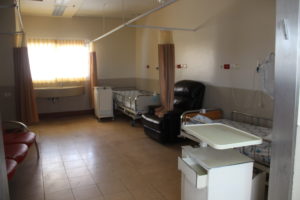
WMC room before
Diane: What hospital is it?
Judy: The Wolfson Medical Center in south Tel Aviv.
We have amazing healthcare in Israel. And we don’t really pay for it. We had done a series of anonymous interviews with patients in another hospital and they were like, “Well, it’s fine. We come; we sit. We get our treatment. The nurses are nice, the place is clean. We get a hot meal provided by the hospital.”
Well, this is what there is. So, they see anything over and above as a huge plus, and they’re very, very appreciative of it.
Diane: What is your vision going forward?
Judy: Well, at the beginning of all of this… not right at the beginning, but maybe 2018, I wanted to do five cancer centers in five years. But I can see now that that won’t happen, because we’re still on Wolfson and things are very slow on all fronts.
“All The Technicalities, The Logistics Of The Travel And The Food And The Accommodations, Would All Be Part Of The Project”
Diane: But that’s a learning curve too. Right?
Judy: Absolutely.
I would like to move faster than I am. But it’s so dependent on so many other things, you know? Contractors and licenses, and everything has to be approved by the government, and the government’s busy with the pandemic.
But we try and maintain a rhythm because we have to carry on. Cancer is here all the time, and there’s a backlog now in cancer diagnosis, for all those months last year that people didn’t go to the doctor because they were frightened of COVID. So yes, I think if we were to do three rooms in five years, I’d be delighted.
My ultimate dream would be to build in the South of Israel, in the desert, a huge cancer center, which would be round and would be made of glass. And it would have everything, all-encompassing, and people would come there for treatments, and they would be able to stay there. There would be facilities, not only hospital facilities, but facilities, or there would be transportation to the nearest town where there would be arrangements with apartments for families, and they would have everything they needed in one place. All the technicalities, the logistics of the travel and the food and the accommodations, would all be part of the project. I would love to do that.
Diane: That’s amazing.
“Empowering Women Is One Of The Most Important Things You Can Do”
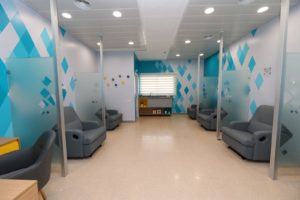
WMC after Place2Heal
Judy: It would be a very, very hugely expensive project that would involve a lot of logistics and fundraising, but you can always dream.
Diane: Oh, always dream. Always dream, right? Because you never know. If you don’t dream, it’s never going to happen.
Judy: I just have one question for you-
Diane: Sure.
Judy: How did you come to do this?
Diane: Oh, the whole blog thing? I’ve always written for myself, but I recently finished up a graduate program in creative writing. I also feel like I reinvented myself in my fifties. I started a new business. I got married. So my life totally changed and I just felt like, “Wow, I want to reach women. And let’s build this sort of community to support each other.” So I started this blog. I think it’s a little bit over two years now. And I do other writing projects.
Judy: I think that empowering women is one of the most important things you can do.
Diane: And for me, it’s older women. We have so much to offer.
Judy: We do.
Diane: And empowering and supporting each other, and having these types of conversations, I feel like they’re so important. Healing, and inspiring. When two women talk like this, what dream is too big?
Judy: Absolutely. I’d love to be part of a bigger picture, to be part of something which isn’t just about what I do, but it’s about a group of people who have reached a certain age and who have decided that they want to just go off track, or on track, whichever way you put it, and-
Diane: Or making new track.
“It I So Important that Women Are Heard And Get To Take A Crack At Things They Want To Take A Crack At”
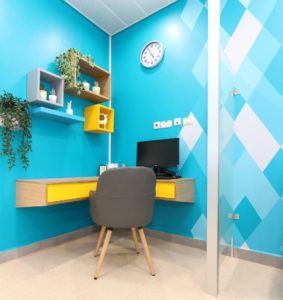
WMC after Place2Heal
Judy: I think women’s empowerment never gets old. It’s so important for our personal growth and self-confidence. And it’s an important lesson for our kids and grandchildren. It is so important that women are heard and get to take a crack at things that they want to take a crack at. Sometimes it doesn’t work. There’s every possibility that in two years’ time, we will just hit a wall, and I will say, “Okay.”
Diane: But I think every bump in the road is an opening for greater creativity. And there are no limits to the different ways to do things. It sounds like your plan is going to work, but if you hit a wall, none of what you’ve learned will go to waste.
Judy: Absolutely.
Diane: The future is in your hands. This is how I see it.
Judy: Yes.
Diane: Do you have any final thoughts?
Judy: No, it’s just been really, really good talking to you.
Diane: Thank you! When two women get together, the sky’s the limit, right?
Judy: Absolutely.
For more on Judy and her work, watch her videos on YouTube, and check out these interviews in The Jerusalem Post and Stitcher. Here’s the place2heal website and links to Facebook and Instagram.
As always, I’d love to hear from you. What are your dreams? What are you doing to make them happen? Please leave a comment or send me an email.
See you May 3th!
XOXO
Diane



Thank you Greta!
I appreciate your encouragement 🌸
Judy Judy Judy ❤️ How much I admire your courage, fortitude and passion. Your test is your testimony and your strength has blessed many. GodSpeed all your endeavors and your health.
Thanks, Dorothy, for your comment! I will make sure Judy sees it. Judy’s strength and passion truly have brought so much light to the world!
Thank you Dorothy!
Another example of unimaginable pain and how a brave, determined woman is using her story to help change the world! Thank you, Judy and Diane!
Thanks, Sherry! Love when “brave, determined women use their stories to change the world!” Judy certainly is one!
Hi Sherry,
I believe us women have immeasurable strength despite the physical and emotional challenges we have and still do face.
Diane helped me express exactly what I wanted to convey.
Judy is amazing! going from being ill, to thinking about other people, having a dream and making it all come true, a one person project, is really something special!! I am proud to be her sister-in-law!
Thank you, Adina, for sharing this! And lucky you to have such an inspiring, courageous sister-in-law!
Thank you Adina!
I couldn’t have come this far without the love and support of our family.
I so get this story and the interviewee! I too had breast cancer at 31, and I have the BRCA1 mutation. So many of the medical environments were devoid of humanity, of connection. I so admire the work she is doing and her advocacy. On behalf of all who struggle with breast cancer, thank you. And thank you, Diane, for this essential conversation about empowering one another and lifting up our fellow sisters.
Thank you, Teri! There are so many among us who can relate to insensitive medical practices. So sorry that you, too, had breast cancer–so happy that you, too, are on the other side of that battle. Yay for women like Judy who make it their mission to foster change. And yay for lifting up our fellow sisters!! I know you do your share of lifting too!
Thank you Terri!
I am always looking to meet new people and share ideas.
Please stay in touch 🌹
What a beautiful, horrifying, triumphant Human story. The bravery of her learning curve is something to emulate.
Such as: “Things are so difficult in the nonprofit sector that the science is critical for funding. They need scientific evidence before backing you.”
The website she provides is lovely and smart.
I am in total agreement with you Greta! “Triumphant human story” is a wonderful way to describe Judy’s path!
Thank you Greta!
I appreciate your encouragement 🌸
The word amazing doesn’t seem strong enough! What a story to inspire us!
Thanks Judy and Diane – both of you bringing beauty to the world!
Thank you, Nicky! Speaking with Judy was so inspiring and I’m very grateful she brought her story to us!
Thank you Nicky!
The positive feedback is what helps me move forward.
There are tough days too.
Thank you 🌻